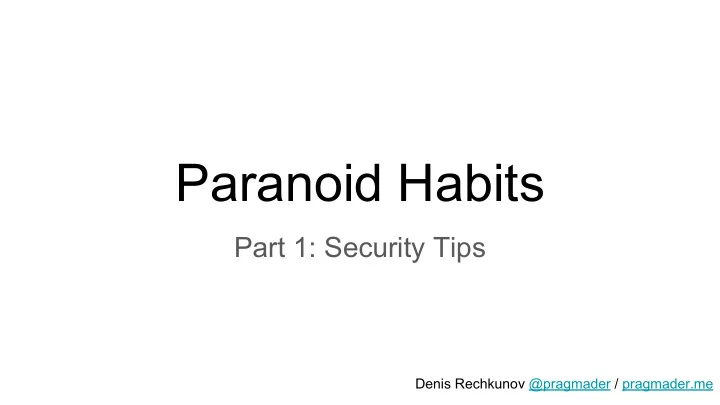

Paranoid Habits Part 1: Security Tips Denis Rechkunov @pragmader / pragmader.me
What’s this about? Topics: ● Authentication ● Phishing ● PGP ● SSH ● USB ● Networking
“Can I trust you, Denis?” ● Trust no one, remember how this talk is called ● I just share what I do myself ● I do my best to follow all the latest infosec topics ● I’m familiar with basic pen-testing, CTF is my hobby ● I reported 6 serious vulnerabilities in my career ● People around me think I’m paranoid
Authentication
Passwords — most common authentication method ● Passwords must be long (>8 characters in 2019) ● Can not contain words, must be random ● Must contain numbers and special characters ● Must be different for each service/web-site/access ● Must be securely stored ● Otherwise, they can be cracked
Passwords — how do people crack passwords? ● It’s not under your control ● Depends on how websites store your password/hash ● Some old hash functions like MD5 are easily crackable with modern hardware and software (hashcat) ● Can be found in dictionaries or brute-forced (up to 8 characters) ● Databases with hashes often get leaked
Passwords — how do people crack passwords? Some services just fail to protect our passwords: ● Twitter was logging plain-text passwords till May 2018 ● GitHub was logging plain-text passwords till May 2018 ● Facebook stored plain-text passwords for years These companies have hundreds or even thousands of employees, how can we trust all of them not to sell it?
Passwords — we’re only humans ● Most humans are not capable to satisfy the requirements ● Please use password managers — still can leak your passwords but it’s better than not having them ● And please, don’t write them down anywhere
I recommend pass — Standard Unix Password Manager, that is based on GPG and Git
Demo (pass)
Passwords alone are not secure
2FA — 2 Factor Authentication ● I’ve never heard of anyone saying “My 2FA-protected account got hacked” ● So, USE 2 FACTOR AUTHENTICATION !
2FA — Options ● SMS — the most insecure, can be intercepted ● Authentication App — bound to your phone that can die, be hacked or stolen ● Security token (e.g. Yubikey) — U2F (Universal 2 Factor)
Demo (U2F)
Passwords? Where we’re going we don’t need passwords
“ One of the primary weaknesses of password-based authentication is that a password is a shared secret ” webauthn.guide
WebAuthn ● Is based on asymmetric cryptography ● You need a security token (e.g. Yubikey) ● Server stores only the public key, so if it leaks it’s useless for an attacker ● Works in mobile and desktop browsers except Safari (still under the experimental flag)
Demo (WebAuthn)
Phishing
Do you remember “Celebgate”? “Collins [person responsible for the attack] allegedly gained access by setting up emails designed to look like official accounts associated with the Google or Apple services used by his celebrity targets.” Washington Post
Check the URL!
PGP
PGP — Pretty Good Privacy (GnuPG) ● In my opinion, the most reliable tool ● 2 modes: ○ Asymmetric — private/public keys ○ Symmetric — encryption with a password ● You can store your keys on a Yubikey and use them for SSH, encryption, signing data (e.g. Git commits)
PGP — Pretty Good Privacy (GnuPG) The tool itself is reliable but plugins for mail clients that use the tool can be vulnerable. Sebastian Schinzel gave a talk at 35c3 how they found some vulnerabilities in email client plugins.
Demo (GPG + Yubikey)
SSH
SSH — Secure SHell ● Don’t use passwords to access your servers ● It’s better to forbid passwords at all: in /etc/ssh/sshd_config PasswordAuthentication no ● Use public/private key pair ● Store the key pair on a Yubikey and use from there
Demo (SSH + Yubikey)
Buy this Yubikey already!
Yubikey ● It’s a write-only security token device ● 2FA (U2F/OTP) ● GPG (Smart Card mode), can store your keys ● SSH via GPG ● FIDO2 (WebAuthn) ● USB-A, NFC, USB-C ● PIN-protected, requires a touch
USB
USB is vulnerable ● Exploiting a device via USB is easier than you think ● There are many ways to hack you via USB ● Don’t use public USB sockets/charging stations, they can be compromised If you still want though...
Use protection!
Networking
Networking — Rules Use a firewall ● iptables for Linux ● Built-in for Mac or LuLu for advanced control
Networking — Observe Look for suspicious traffic: ● iftop for Linux (*nix systems) ● netstat -atulp
Demo (iptables, iftop)
Links ● have i been pwned? ● pass — the standard unix password manager ● Four embarrassing password leaks on live TV ● WebAuthn Guide ● Yubico (Yubikey manufacturer) ● Guide to using YubiKey for GPG and SSH ● Attacking end-to-end email encryption
“ Sorry, my account got hacked ” is the new “ The dog ate my homework ” Linus Sebastian
Thank you! Q/A
Recommend
More recommend